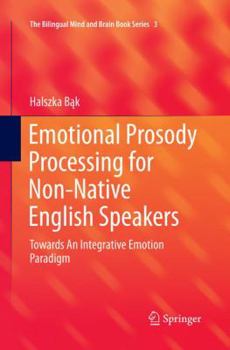Emotional Prosody Processing for Non-Native English Speakers: Towards an Integrative Emotion Paradigm
(Book #3 in the The Bilingual Mind and Brain Book Series Series)
Select Format
Select Condition 
Book Overview
Chapter 1 Emotional relativity - argument from nurture
1.1 Introduction
1.2 The relativity of emotions in anthropology
1.1.1 The dawn of relativity - Franz Boas and salvage anthropology
1.1.2 The principle of linguistic relativity and the dual system of language - Edward Sapir
1.1.3 Relativity through habituation and the seeds of confusion - Benjamin Lee Whorf
1.1.4 From linguistic relativity principle to the Sapir-Whorf Hypothesis1.1.5 Relativity of emotions in syntactic structures
1.1.6 Emotional relativity in semantics
1.1.7 Non-verbal and pragmatic emotional relativity
1.3 Conclusions - emotional relativity
Chapter 2 Emotion universals - argument from nature
2.1 Universalism in the psychological research on emotions
2.1.1 The great pioneer - Charles Darwin's Expression of emotions in man and animal
2.1.2 The forefathers of psychology: Wilhelm Wundt and William James2.1.3 Between the dawn and rebirth - from the forefathers to Paul Ekman
2.1.4 The universalist - Paul Ekman
2.1.5 Resistance and revisionism - the Post-Ekmanians
2.1.6 Conclusions - emotional universalism
2.2 Between specificity and universalism - conclusion
Chapter 3 Linguistics - the great absentee
3.1 Introduction3.2 From Saussure to Chomsky - The Great Abstraction
3.3 Semiotics
3.4 Semantics
3.5 Pragmatics
3.6 Conclusions
Chapter 4 A different look at emotion processing models
4.1 A different approach to modelling and visualization
4.2 The classic models of emotion processing
4.3 Transition stage - Discrete emotions vs. Early dimensional models of emotion
processing
4.4 Current approaches - From skeptical resistance to deep complexity4.5 Conclusions - The Cartesian see-saw
Chapter 5 The state of emotional prosody research - A meta-analysis
5.1 Introduction
5.2 Consensus on the nature of emotional prosody processing
5.3 Literature review selection criteria
5.3.1 On the development and validity of stimuli for emotional prosody research
5.3.2 On the populations involved in emotional prosody research5.4 The state of emotional research - evaluation





